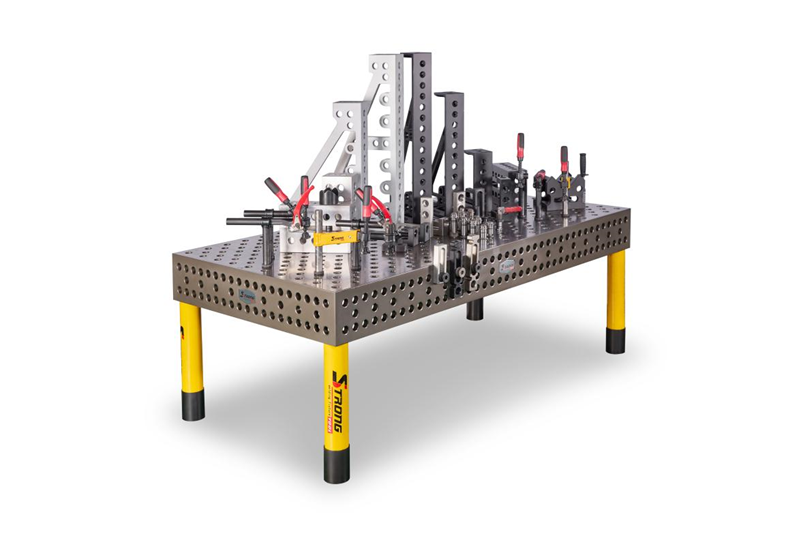— PRODUCT —
— PRODUCT —
PRODUCT Customer Service 86(21)-65683273
Customer Service 86(21)-65683273 E-mail:info@shwgec.com
Phone:(86)21-6568 3273
Add:No.38,Taiding Enterprise Park, Baoshan Urban Industrial Park, Shanghai, China
Series 28 3D Welding Fixture
3D flexible modular welding fixtures are widely used in modern welding, utilizing standardized components (worktables, positioning modules, clamps, etc.) to quickly position and clamp workpieces of varying sizes and shapes. They enhance flexibility, efficiency, and precision, with advantages including high productivity, strong adaptability, controllable weld quality, and cost-effectiveness.
1. Ultra-High Flexibility for Multi-Product Welding
This core advantage allows rapid adaptation to workpieces of different specifications and shapes without custom fixtures.
Modular customization: Standardized components (grid platforms, positioning blocks, clamps) assemble freely for workpieces of all sizes (from small parts to large structures) and shapes (flat, curved, irregular), suitable for simple plate welding to complex frames or boxes.
Quick production switches: No need for new custom fixtures when changing products—just reconfigure components. Switch times decrease from "days/weeks" (traditional) to "hours/minutes," ideal for small-batch, multi-variety production (engineering machinery, rail transit, etc.).
2. Significantly Higher Welding Efficiency
Simplified setup and reduced auxiliary time accelerate production.
Faster preparation: Traditional fixtures take weeks to design and manufacture; 3D flexible ones use standard parts to reduce new workpiece setup time by over 70%.
Less auxiliary work: Modular components speed up positioning, clamping, and flipping (e.g., adjustable clamps for angles, universal joints for curves), letting welders focus on welding and boosting output.
Automation readiness: Standard bases (with T-slots, grid holes) integrate seamlessly with robots, positioners, and conveyors, enabling automated lines for mass production.
3. Ensured Welding Precision & Yield
Precision components and smart positioning guarantee stable, accurate welding.
High-accuracy parts: Core components (reference platforms, pins) meet IT7 standards, with positioning hole tolerances of ±0.02/100mm and base flatness within 0.1/2000mm per meter, minimizing deformation or size errors.
Controllable clamping force: Pneumatic/hydraulic or mechanical clamps adjust force to avoid workpiece damage or displacement, ensuring consistent weld joints.
Repeatable precision: Once calibrated, fixtures maintain ±0.05mm repeatability for batch production, reducing scrap and rework.
4. Lower Overall Costs
Modular design reduces long-term expenses.
Reduced custom fixture costs: Eliminates the need for one-off fixtures, saving over 90% on development costs—ideal for fast-iterating, multi-product enterprises.
Less inventory/maintenance: Components are stored centrally, with easy replacement of single parts (pins, pads) instead of full fixture replacement, lowering storage and upkeep costs.
Longer lifespan: Hardened alloy steel (or stainless steel) components last over 10 years (vs. 3–5 for traditional fixtures), spreading costs.
5. Easy Operation, Reduced Skill Dependence
Standardized design simplifies use.
Intuitive assembly: Clear scales and connectors allow untrained operators to build fixtures after brief training, solving "skilled worker shortages."
Simple debugging: Tools like dial indicators quickly calibrate flatness/verticality, reducing onboarding time.
Multi-angle welding: Adjustable joints fix workpieces at any angle (overhead, vertical), avoiding manual flipping and reducing damage risk.
6. Space-Efficient for Diverse Scenarios
Compact, flexible design fits all sites.
Reusable components: Idle parts rebuild new fixtures, saving space—critical for small workshops or on-site welding.
Expandable bases: Multiple standard platforms connect to handle large workpieces (e.g., machinery frames), avoiding custom oversized fixtures and improving space use.
The 3D flexible modular welding fixture’s core value is "adapting to change via standardization." It breaks traditional "one-to-one" fixture limits, enhancing precision and efficiency while cutting costs—perfect for modern "multi-variety, small-batch" manufacturing. It’s key to upgrading welding from "custom" to "standardized, smart" processes.
